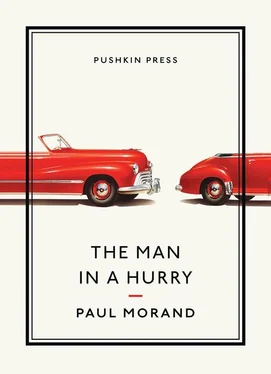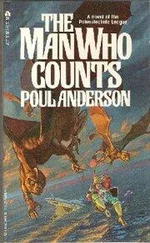*
Pierre went downstairs with Regencrantz, having offered to drop him by car in the centre of town if, in exchange, he would agree to accompany him beforehand for a brief walk in the Bois de Boulogne.
“Let’s go quickly, doctor, quickly, what they call presto.”
“Quickly, Monsieur Niox? I thought you were cured?”
“Basically, you’re right,” Pierre replied, laughing. “Why quickly? My meeting is not until four o’clock.”
Which did not prevent them from setting off at full tilt down to the Bois.
“Looking at these police lights, flashing red and green alternately,” Regencrantz continued, carrying on with his theme and hanging onto the door handle, “you will observe that we do not advance at a regular pace, but rather in a series of leaps interrupted by stops. This is how nature and genius behave.”
“Let’s get out and walk now,” said Pierre, interrupting him.
The doctor did his best to follow; he ran after him with very short steps, on his heels, taking care not to slip, as though on ice. After a quarter of an hour he could go no farther and spoke in a panting voice:
“One day… I met… a man… the fastest in the world, a famous record-holder…”
“Commodore Swift, perhaps?” asked Pierre respectfully.
“The very man.
“You must hear this anecdote. It’s made for you even in its moral aspect. But let’s stop here, please. I am, as you say, exhausted.”
Struggling for breath, Regencrantz collapsed onto a bench.
“Give me time to tell you my story…”
“I’m listening to you patiently,” said Pierre.
“I had discovered during a trip to the United States that Commodore Swift happened to be at a country club to the north of Salt Lake and it struck me as a unique opportunity to encounter the record-holder. Some friends arranged it all for me. Shortly beforehand, Swift had reached a speed of eight hundred and eighty-two kilometres per hour, that’s two hundred and forty-five metres per second. He had not only brought the earth closer to the air and the car to the aeroplane, and to sound, and to light, and to all the ethereal things that are transmitted and propelled with greater freedom, but he had also gained sovereign rights over all sportsmen and also over all those men in a hurry in the world who, like you, Monsieur Pierre Niox, should recognize him as king.”
“Speed like that, it’s the infinite,” sighed Pierre admiringly.
“Whereas I find that a number, no matter which one, even a record-breaking number, restricts and stifles the infinite,” replied the doctor. “When I walked into the lounge of the country club, it appeared to me to be empty. One man, just one, was there, slumped in an armchair. His legs were stretched out on the table and you could see the thick soles of his shoes, his arms hung down, his eyes were half closed, and he stared at me without blinking; he looked like a piece of furniture or, rather, a building, so rooted to the spot did he seem. Outside, through the thick bay windows of the monastic room, I noticed the beach, extending over a glassy surface which it prolonged, differing from it only in its paler shade of colour. Low, grey clouds sped by.
“At this hour of the morning, in America, everybody has left for work. Men and women were bustling about, people were running to their place of employment, the suburban trains were hurtling over the points bringing businessmen to more business meetings. I was shocked to see this man, on his own, lying motionless in an armchair in the empty lounge of a club.
‘I’m sorry I’m late,’ I ventured.
‘You’re actually early.’
‘Are you sure that I shouldn’t have waited and that the commodore will still be able to see me?’
‘Doctor Regencrantz,’ he said, ‘the commodore has nothing to do. I am the commodore.’
He held out the empty palms of his enormous hands, useless machine tools. He also pointed to his inactive feet, hanging in the air as though on pedals.
‘Lousy climate, it really is,’ he sighed.
I looked at him in astonishment, so amazed that I could not utter a word.
‘Does it surprise you that I should have nothing to do? All winter, I’ve been tuning up Fireflash . In the wind-tunnel workshop I had to alter the rear compression tanks which were producing too much resistance, reduce the heavy tubing of the radiator, because Fireflash was nose-diving, then rebuild it in light metal because the water was boiling too quickly. The car’s ready now and all I can do is wait.’
‘And what are you waiting for, commodore?’ I asked with interest.
‘A favourable day, and during that day, a propitious hour, and during that hour, the few necessary seconds.’
‘What!’ I exclaimed, ‘Is it possible that since the winter…’
‘That’s right. What do you expect, adverse winds were blowing up until April; in May the ground became clayey; at the beginning of July the first tornadoes arrived. In short, I’ve been waiting for the right moment for four months, for one hundred and seventeen days exactly,’ he groaned angrily.
I risked a joke:
‘Is there a great deal of slack season in a racing driver’s job?’ I said.
‘Yes. I can say that for eight months I haven’t progressed an inch.’
Commodore Swift crossed his legs wearily; he sucked at his tobacco-less pipe. He sighed and looked around him like a paralysed man waiting for the nurse to come by so that he could have his vegetable broth. His innocent face, covered with patches of red, turned towards me, imploring, gentle and without hope. He stood up slowly, somewhat unsure of his movements, his muscles limp, his centre of gravity unsteady, uncertain in his gait and in the future of all progress on foot.
‘We can always go to the garage,’ he said to me, ‘that will keep us busy for a while. You’ll see Fireflash. Fireflash has been around a long time, but she’s a beautiful piece of machinery all the same.’
Once the car had been found and the tarpaulin removed, I caught sight of a mass of crimson-red curved sheet metal which, due to it having been designed for speed, no longer had any shape. The eye slipped over her like the wind. She was not slender like the petrel or spindly like a torpedo; from a forty-five-degree angle, she resembled a plate, in profile a pear, and from the front a large soup tureen. She lay heavily on the sand, plump, pot-bellied and dormant.
‘What!’ I thought, ‘Can this be the machine that the fastest things have difficulty grasping hold of and whose striated, elongated and egg-shaped image is transmitted to us by belinograph all over the globe?’
The commodore started her up and, through a narrow neck, slid down into the single seat. It was as if the flesh of a lobster were returning with difficulty into the shell of the claw. He pumped the throttle, switched on the ignition, released the compressed air and obtained a few splutters.
‘Is this for a test run?’ I asked, delighted already.
‘I’d be surprised. What’s the wind speed this morning?’
‘Thirty-two metres per second,’ replied an assistant.
‘What did we have yesterday? At the same time?’
‘Twenty-seven metres per second.’
‘Above eighteen metres per second, there’s no point in attempting anything,’ the commodore sighed resignedly. ‘I’m not starting up just to amuse you, doctor.’
The American’s head disappeared into the sheet metal and his voice was drowned out by the thunder of quadruple exhaust pipes. The mechanics were bustling about already, but with a motion of his hand he indicated to them not to move. Installed like a worm inside his pear, the record-breaker sat motionless in the midst of his 600 horsepower, his machine that was unable to take off, the sixty-four cylinders that strove to no purpose, his sixteen carburettors which, through the static, exuded petrol that at any moment could be transformed into energy.”
Читать дальше












